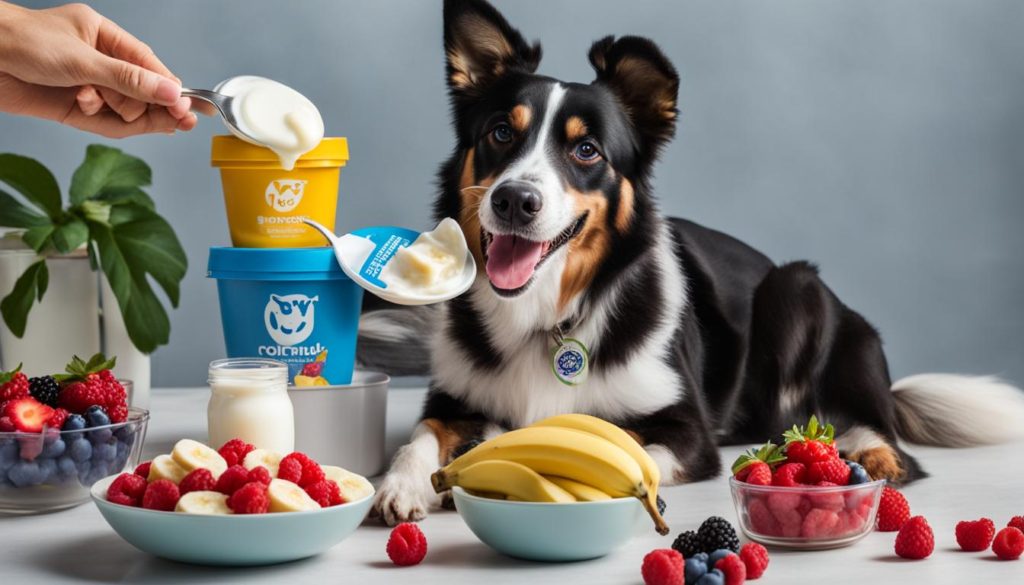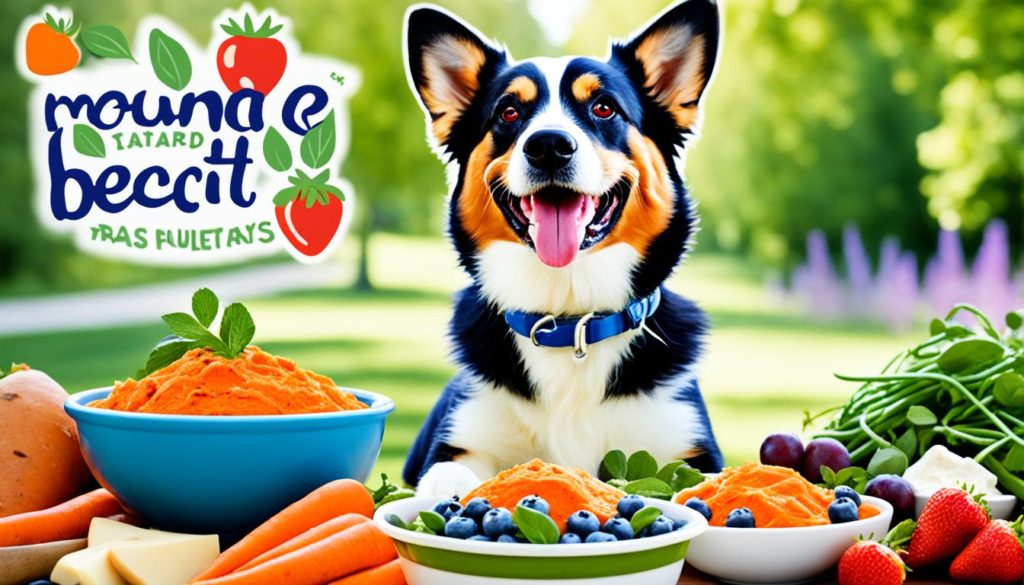Are you wondering whether it’s safe to give your dog Greek yogurt every day? Greek yogurt can indeed be a safe and healthy treat for your canine companion, but there are a few things to keep in mind to ensure their well-being.
When it comes to choosing yogurt for your dog, opt for plain or non-fat plain yogurt without any sweeteners or preservatives. This will ensure that your dog receives the full benefits of Greek yogurt without any harmful additives. It’s important to avoid yogurt that contains xylitol, a sweetener that is toxic to dogs and can lead to liver failure.
While Greek yogurt itself is safe for dogs, flavored yogurts with fruits or other mix-ins should be avoided due to added sugars and artificial sweeteners. Additionally, dogs may have difficulty digesting lactose in yogurt, so it’s best to limit their intake to prevent gastrointestinal issues.
Key Takeaways:
- Choose plain or non-fat plain yogurt for your dog, without sweeteners or preservatives.
- Avoid yogurt flavored with fruits or other mix-ins that contain added sugars or artificial sweeteners.
- Ensure the yogurt does not contain xylitol, which is toxic to dogs.
- Limit your dog’s yogurt intake to prevent potential digestive issues from lactose.
The Benefits of Greek Yogurt for Dogs
Greek yogurt offers several benefits for dogs. It is a rich source of calcium, which is essential for bone health. It also contains protein, which is important for muscle development and repair. Greek yogurt can act as a probiotic, promoting a healthy gut and aiding digestion.
“Greek yogurt provides dogs with important nutrients like calcium and protein while also supporting their digestive health.”
However, it should be noted that the amount of yogurt necessary to provide significant probiotic benefits may be more than what is suitable for a dog’s daily caloric intake. In such cases, veterinarians may recommend specially formulated probiotic supplements or dog food to better support a dog’s digestive health.
When incorporating Greek yogurt into your dog’s diet, it’s important to do so in moderation and as part of a balanced diet. Consult with your veterinarian to determine the appropriate amount of Greek yogurt for your dog based on their size, weight, and specific nutritional needs.
Evidence supporting the benefits of Greek yogurt for dogs:
- Calcium for strong bones and teeth
- Protein for muscle development and repair
- Probiotic properties for a healthy gut and improved digestion
Comparison: Greek Yogurt vs. Regular Yogurt for Dogs
While regular yogurt can still provide some nutritional benefits, Greek yogurt typically contains a higher protein content and lower lactose levels compared to regular yogurt. This makes Greek yogurt a preferred choice for dogs, especially those with lactose intolerance or sensitivity.
| Benefits | Greek Yogurt | Regular Yogurt |
|---|---|---|
| Higher protein content | ✓ | ✕ |
| Lower lactose levels | ✓ | ✕ |
| Rich in calcium | ✓ | ✓ |
| Provides probiotic benefits | ✓ | ✓ |
As with any dietary change, it is important to introduce Greek yogurt to your dog gradually and monitor their response. If you notice any digestive issues or adverse reactions, consult with your veterinarian for further guidance.
Determining the Right Serving Size for Your Dog
When it comes to feeding your dog yogurt, it’s important to find the right serving size. The amount of yogurt that is suitable for your dog depends on various factors including their size, weight, daily calorie intake, underlying health issues, activity level, and neuter status.
As a general guideline, yogurt should not make up more than 10 percent of a dog’s daily caloric intake. This ensures that your furry friend receives a balanced diet and avoids any potential digestive issues.
To determine the specific serving size of yogurt for your dog, it’s essential to take into consideration their nutritional needs. Consulting with a veterinarian can help you make an informed decision and tailor the serving size to your dog’s unique requirements.
When selecting yogurt for your dog, it’s crucial to check the label for calorie and fat content. This will assist you in measuring the right serving size and ensuring that you provide the appropriate amount for your dog’s needs.
Remember, moderation is key when feeding your dog yogurt. While it can be a healthy and tasty treat, it should not replace their regular meals or exceed the recommended serving size.
| Dog Size | Daily Caloric Intake (Kcal) | Maximum Yogurt Serving Size |
|---|---|---|
| Small (up to 20 lbs) | Less than 500 | Up to 50 Kcal (10% of daily calories) |
| Medium (20-50 lbs) | 500-1000 | 50-100 Kcal (10% of daily calories) |
| Large (50-100 lbs) | 1000-1500 | 100-150 Kcal (10% of daily calories) |
| Giant (over 100 lbs) | 1500 or more | 150 Kcal or more (10% of daily calories) |
Table: Recommended Maximum Yogurt Serving Size Based on Dog Size
Choosing the Right Yogurt for Dogs
When it comes to selecting yogurt for your furry friend, it’s essential to make the right choice. The best kind of yogurt for dogs is plain or non-fat plain yogurt without any sweeteners or preservatives. It provides a healthy option packed with beneficial nutrients for your canine companion.
Greek yogurt is also a suitable choice for dogs, but it’s important to ensure it is xylitol-free. Xylitol is a sweetener that can be toxic to dogs, leading to liver failure. To keep your furry friend safe, always double-check the label to make sure the yogurt you choose doesn’t contain this harmful ingredient.
Avoid yogurt flavored with fruits or any “mix-ins.” These variations often contain added sugars and artificial sweeteners, which are not suitable for dogs. Stick to plain yogurt to ensure your dog gets the optimal nutritional benefits without any unnecessary additives.
Additionally, consider opting for yogurt with live cultures. These probiotics can provide additional health benefits for your dog’s digestive system. Probiotics help promote a healthy gut and aid in digestion, supporting your dog’s overall well-being.
Incorporating the right yogurt into your dog’s diet can contribute to their overall health and well-being. By choosing plain or non-fat plain yogurt without sweeteners or preservatives and avoiding flavored varieties, you provide a nutritious and delicious treat for your dog.
Introducing Yogurt into Your Dog’s Diet
When it comes to incorporating yogurt into your dog’s diet, it’s important to take a gradual approach. Start by introducing small amounts of yogurt and monitor your dog’s response. If your dog shows no signs of adverse reactions or digestive issues, you can gradually increase the serving size.
Mixing yogurt into your dog’s regular food can be an effective way to incorporate it into their diet. Simply add a spoonful of yogurt to their meal and mix it well. This allows your dog to enjoy the benefits of yogurt while also sticking to their familiar eating routine.

Frozen Yogurt Treats
Another fun way to include yogurt in your dog’s diet is by offering frozen yogurt treats. Especially during warmer days, frozen yogurt treats can provide a refreshing and nutritious snack for your furry friend. To make frozen yogurt treats, simply pour plain yogurt into ice cube trays or silicone molds and freeze until solid. You can also add small pieces of dog-friendly fruits such as blueberries or bananas for added flavor and variety.
Training Treats
Yogurt can also be used as a tasty training treat to reward your dog’s good behavior. Simply put a small amount of yogurt into a squeeze tube or a training treat bag for easy dispensing. The tangy taste of yogurt can serve as a motivating reward during training sessions, making them more enjoyable for both you and your dog.
Monitoring and Considerations
While incorporating yogurt into your dog’s diet can have several benefits, it’s essential to be mindful of a few considerations. Make sure to choose plain yogurt without any added sugars or artificial sweeteners. These additives can be harmful to your dog’s health and should be avoided. Furthermore, closely monitor your dog for any adverse reactions or digestive issues when introducing yogurt into their diet. If you notice any concerns, it’s best to consult with your veterinarian.
Table: Pros and Cons of Incorporating Yogurt into Your Dog’s Diet
| Pros | Cons |
|---|---|
| Provides calcium for bone health | Potential lactose intolerance or sensitivity |
| Source of protein for muscle development | Risk of digestive issues if consumed in excess |
| Can aid digestion as a probiotic | Added sugars and artificial sweeteners in flavored yogurts |
Yogurt-Inspired Recipes for Dogs
If you’re looking to treat your furry friend to something special, try these delicious yogurt-inspired recipes for dogs. Not only are they tasty, but they also provide a nutritional boost for your canine companion. Just remember to use plain yogurt without added sugars or artificial sweeteners to ensure your dog’s health and safety.
Dog-Friendly Cheesecake Enriched with Anti-Inflammatory Extras
If your dog loves cheesecake, they’ll go crazy for this dog-friendly version. Made with a creamy yogurt and topped with anti-inflammatory extras, it’s a guilt-free indulgence for your pup. Here’s what you’ll need:
- Plain yogurt
- Pureed blueberries or strawberries
- Ground flaxseed
Mix the plain yogurt with pureed blueberries or strawberries for a burst of fruity flavor. Then, sprinkle ground flaxseed on top to add some extra anti-inflammatory goodness. Freeze the mixture in small molds or ice cube trays and serve chilled. Your dog will thank you for this delightful treat!
Frozen Pate Bites
This refreshing snack is perfect for hot summer days or as a special reward during training sessions. Here’s what you’ll need:
- Plain yogurt
- Chicken or beef broth
- Diced carrots or peas
Mix plain yogurt with chicken or beef broth to create a smooth and creamy base. Then, add in diced carrots or peas for a pop of color and added nutrients. Pour the mixture into small silicone molds or ice cube trays and freeze until solid. Your dog will love the cool and refreshing taste of these frozen pate bites!
Pumpkin Peanut Butter Frozen Treats
Looking for a treat that combines the delicious flavors of pumpkin and peanut butter? Look no further! Here’s what you’ll need:
- Plain yogurt
- Pureed pumpkin
- Unsalted peanut butter
Combine plain yogurt with pureed pumpkin for a creamy and nutritious base. Add a dollop of unsalted peanut butter for an extra burst of flavor. Mix well and pour the mixture into silicone molds or ice cube trays. Freeze until firm, then let your dog enjoy these tasty pumpkin peanut butter frozen treats!
Remember, always consult with a veterinarian before introducing new recipes or treats into your dog’s diet. These yogurt-inspired recipes can be a great way to show your pup some love while providing them with essential nutrients. Treat your furry friend to these homemade delights and watch their tail wag with joy!
| Recipe | Ingredients |
|---|---|
| Dog-Friendly Cheesecake Enriched with Anti-Inflammatory Extras | Plain yogurt, pureed blueberries or strawberries, ground flaxseed |
| Frozen Pate Bites | Plain yogurt, chicken or beef broth, diced carrots or peas |
| Pumpkin Peanut Butter Frozen Treats | Plain yogurt, pureed pumpkin, unsalted peanut butter |

Conclusion
Greek yogurt can be a safe and nutritious treat for dogs when given in moderation. It is important to choose the right kind of yogurt to ensure your dog’s well-being. Opt for plain or non-fat plain yogurt without any sweeteners or preservatives, as these options are the best for dogs. Avoid yogurt with added sugars or artificial sweeteners, as well as flavors that may contain fruits or other mix-ins.
Dogs may have difficulty digesting lactose in yogurt, so it is essential to monitor their intake and watch for any adverse reactions. While Greek yogurt provides several benefits, including calcium and protein, it is crucial to incorporate it into your dog’s diet in an appropriate serving size.
Always consult with a veterinarian for specific guidance on incorporating yogurt into your dog’s diet. They can help determine the right portion size based on your dog’s size, weight, and nutritional needs. By following these guidelines, you can ensure that your furry friend enjoys the benefits of Greek yogurt safely.
FAQ
Can I give my dog Greek yogurt every day?
Yes, you can give your dog Greek yogurt every day, but it should be fed in moderation and as part of a balanced diet.
Is Greek yogurt safe for dogs?
Yes, Greek yogurt is safe for dogs, as long as it is plain or non-fat plain yogurt without any sweeteners or preservatives. However, it is important to avoid yogurt with xylitol, a sweetener that is toxic to dogs.
What are the benefits of Greek yogurt for dogs?
Greek yogurt offers several benefits for dogs, including being a rich source of calcium for bone health, a protein source for muscle development, and a probiotic that promotes a healthy gut and aids digestion.
How much yogurt should I feed my dog daily?
The appropriate serving size of yogurt for dogs depends on various factors, such as the dog’s size, weight, daily calorie intake, and overall health. As a general guideline, yogurt should not make up more than 10 percent of a dog’s daily caloric intake. It’s best to consult with a veterinarian to determine the specific serving size for your dog.
What kind of yogurt is best for dogs?
The best kind of yogurt for dogs is plain or non-fat plain yogurt without any sweeteners or preservatives. Greek yogurt is also suitable for dogs, but it should be xylitol-free. Avoid yogurt with added sugars or artificial sweeteners, as well as flavors that may contain fruits or other mix-ins.
How do I introduce yogurt into my dog’s diet?
When introducing yogurt into your dog’s diet, start with small amounts and gradually increase the serving size. You can mix yogurt into your dog’s regular food or offer it as a frozen treat. Monitor your dog for any adverse reactions or digestive issues.
Are there any yogurt-inspired recipes for dogs?
Yes, there are various yogurt-inspired recipes for dogs, including dog-friendly cheesecake, frozen pate bites, and pumpkin peanut butter frozen treats. Always use plain yogurt without added sugars or artificial sweeteners in these recipes and consult with a veterinarian before introducing new recipes or treats.
Can I give my dog Greek yogurt every day?
Yes, you can give your dog Greek yogurt every day, as long as it is plain or non-fat plain yogurt without any sweeteners or preservatives. However, it is important to feed it in moderation and consider your dog’s overall diet and health.
